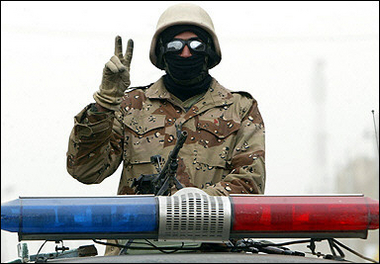|
Iraqis prepare for hard talks on cabinet make-up
(AFP)
Updated: 2006-01-22 08:59
Iraqi parties were preparing for long and hard talks on forming a coalition
government, with the victorious Shiite factions likely to call the shots on how
broad based it will be.
The intricate negotiations were expected to take weeks, with one Western
observer saying he did not expect a full government to emerge before late March
-- more than three months after the December 15 elections.
The conservative Shiite United Iraqi Alliance, which holds the largest bloc
in the new parliament, with 128 of its 275 seats, has agreed to a government of
"national unity", but it remains unclear to what extent minority Sunni Arabs
will be represented.
Sunnis are now major players in the political field after they saw their
parliamentary representation triple to a total of 58 seats after community
leaders had called for an end to their boycott of elections.
The Kurdish Alliance, the main Shiite partners in the outgoing cabinet, won
53 seats and will certainly also be included in the new government line-up.
But Western officials warned it was not just a matter of arithmetic.
"I think it is much more about negotiating package deals," one official said.
"I could imagine that the second half of February, early March will be spent
negotiating that (government) programme before they really get into the business
of choosing people for the job" of government ministers, the official said.
"Because if they don't agree on the programme, you may see coalition partners
drop out," he said.
Mahdi Hafez, a former minister in the provisional government who joined
former prime minister Iyad Allawi's cross-sectarian Iraqi National List, said
that Shiites because of their numbers favoured divvying up cabinet seats on a
proportional basis.
"It's true that the Shiite Alliance favours a government make-up based on
electoral results," he said. "But other parties, starting with the Kurds, no
longer accept just a Shiite-Kurdish coalition and that's why the Alliance will
have to compromise," he added.
The outgoing government counted a few co-opted Sunni ministers, but their
presence failed to alleviate fears within the community that minority rights
would be respected.
"Sprinkling a few Sunnis at the last minute, almost like parsley flakes on
top of a dinner, is not a way to maximize Sunni Arab community buy-in," a
western observer suggested.
Political Sunni engagement is seen as essential to isolating insurgents who
derive much of their support from the once-powerful community favoured by ousted
dictator Saddam Hussein.
Sunni leaders have decried the election results, claiming fraud, but while
Sunni and other parties have said they will register official complaints with
the judicial body charged with certifying the elections, none have so far said
they would boycott talks on forming a government.
"Despite these facts (of fraud) we will continue to participate in the
political process and these results will not affect our activities because we
are aware of our national duty," said Adnan al-Dulaimi of the Iraqi People's
Conference Party, one of the main Sunni Arab political parties.
|

An Iraqi soldier flashes the V-sign for victory as
he patrols the streets of the Iraqi capital Baghdad. Iraqi parties were
preparing for long and hard talks on forming a coalition government, with
the victorious Shiite factions likely to call the shots on how broad based
it will be.[AFP/Ali al-Saadi] | "We will
coordinate with the political blocs that share our principles and form a
national unity government," he told AFP.
"We will work to prevent sectarianism from dominating the political process,"
he added.
The United States, Britain, Canada, and the United Nations all welcomed the
election results with US State Department spokesman Sean McCormack saying
Washington wanted Shiites, Kurds, Sunni Arabs and others to "work together in
cross-sectarian, cross-ethnic efforts to think about forming a government."
Meanwhile, in the latest violence, rebels killed eight people, including
three policemen, in a series of attacks across the country.
This followed a series of attacks on US and Iraqi military bases in the Sunni
town of Ramadi, 100 kilometres (60 miles) west of Baghdad, on Friday just as
election results were being announced.
A delegation from the Council on American-Islamic Relations (CAIR) arrived in
Baghdad to appeal for the release of American journalist Jill Carroll, abducted
in Baghdad on January 7 by gunmen who shot dead her interpreter.
Sunni Arab leaders in Iraq and Muslims around the world have pleaded for her
release. A deadline set by her kidnappers, who said they would kill the
28-year-old reporter unless US forces freed Iraqi women detainees, expired late
Friday.
|